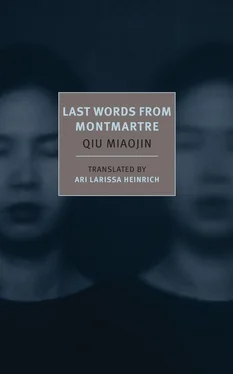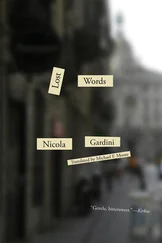“ Pour mon oiseau chinois dont j’attends qu’elle m’envoie une message de sa plume .” (“For my little Chinese bird, from whose pen I’ve been waiting to receive a message.”)
This is how my professor, head lowered as if she dare not look at me, signed the first page of her new novel, La fiancée Juive de la tentation .
Heart racing, I received the novel from her hands. Across the table, I said I wanted to give her a kiss, and she stood to let me kiss each cheek, and I shyly said in Chinese in her ear, “I love you,” and then repeated this in French in the courteous form, “ Je vous aime ” (though actually it should have been the intimate form, “ Je t’aime ,” but I was too shy to tell her). She handed me a blank sheet of paper and I wrote down the Chinese for her: I love you.
I practically bounded with joy all the way home. It must have been almost eight when I exited the Simplon Métro stop on the number 4 line and walked along rue Joseph Dijon. In the middle of Montmartre, in front of the Mairie, the church bells rang out from the Église Jules Joffrin, reverberating through my body and soul…. I grabbed the professor’s novel from my backpack, reread the inscription, and realized that the “message” she’d been waiting for me to “send” to her was the exact one I had written, as if possessed by a spirit, transcribing “I love you” in Chinese…. “Message” was a key word that she often talked about in her lectures as well used as une métaphore . What did this minor transport signify for my life?
The whole of March 18 was so poetically and emotionally satisfying that I went a little wild.
Midnight in Paris, early morning in Tokyo, I called Yong and told her I had hurt myself badly and was preparing to die that night and would not make it back to Tokyo. When I thought she was insulting me, I hung up on her. She called me right back, pissed off, and began a fierce argument over the phone. She spoke wildly and said that if I really wanted her to spend her tuition money, her living expenses, plus money that could be used for my medical bills, all on international phone charges then so be it! She asked what she could possibly do in that exact moment? I felt deeply ashamed of myself and swore that no matter what I would never reach out to her in such a precarious state again.
“I know you think you may be better off dead, but when you die you disappear forever, and I would never see you again…. ”
March 24. Tokyo at dusk. We’d been apart for three years. At the arrival gate at Narita airport I finally saw her again.
Short black jacket, black pleated skirt, a yellow wool knit sweater. The black so elegant, the yellow eye-catching. Her long hair was combed neatly back, and the little makeup she wore highlighted her red lips and big sparkly eyes. She was carrying a chic little black purse. I thought she looked great and had grown up a lot.
Before I left Paris I had gotten a haircut, threw out my old jeans, and bought an entirely new outfit. Brown plaid overcoat, soft gray pants with black stripes, white cotton shirt, a cream-colored vest, a worn brown cap and brown leather shoes, a gray scarf. I pulled one suitcase along and wore a black backpack. Inside the suitcase I had packed some clothes and many books: a biography of Marguerite Yourcenar, Derrida’s Mémoire d’aveugle , my professor’s audiobook Préparatifs de noces au delà de l’abîme , and a lot of Chinese poetry…. My diary and sleeping pills were in my backpack. I wanted to look my best for her, a final image of myself.
After I passed through customs I saw her in the crowd right away, but she didn’t see me. I called out to her and leaped over to kiss her….
We rode the high speed train to Tokyo. She couldn’t stop talking about the landscape on the way, rude Japanese people, her daily life, how she’d been waiting for me all afternoon, scanning the screens for my arrival, searching for my face among the hundreds of faces until her eyes hurt, expecting to see me in blue jeans and a black jacket, fearful of missing me because I had told her I didn’t have much money and had forgotten all my English, and that it was my first solo trip to Tokyo, so she couldn’t leave me alone in Narita…. On and on she talked as I smiled quietly and listened. Neither of us dared look at the other, until suddenly she turned to me and said, “It’s good to see you.”
She was so happy, but she’s not the type to admit it, I could tell.
Yong, if I tell you the whole truth, if I expressed my undying love for you with all my being, could you handle it? Would you accept me? Or would you laugh or get angry, or turn your back and sink into silence? If I no longer try to conceal anything from you, shed away my pretense, would you find this blasphemous?
MAY 18
Before our reunion in Tokyo, I had never really felt I could love and be loved in such a way.
The significance of this special experience will disappear from the world unless I recount it. So few dare to articulate their unique experiences and try to distinguish nuances of meaning between them….
In the five years I’ve known Yong, communication with her wasn’t easy. She and I maintained a nihilistic relationship where I had little power to act. She wouldn’t actively communicate with me or tell me what she was thinking, while also ignoring anything I tried to communicate to her.
The biggest difference between Yong and Xu was that I wasn’t sure if Yong really accepted me or not. Xu accepted me to such a high degree that we were able to cultivate a relationship of long-term, intimate communication that enlarged my powers as a lover to the point where it approached the level of la disponibilité absolue . In the absence of this kind of acceptance, the vitality of my love was weakened; it became like a hair preserved in the amber of an ancient tree. Yong suspended the love I offered her in that amber. By contrast, “acceptance” was a big part of Xu’s personality, so even at the height of her betrayal and deception and apathy and avoidance, I could still feel her “acceptance” of me, from a certain ingrained knowing of her soul that was beyond pure experience. If she were to fade away from my life, I would still sense her “acceptance” of me through a kind of shared telepathy.
(That said, the flip side of “acceptance” is “passivity.” At its most extreme, one’s “passivity” is also the pinnacle of weakness, and Xu wounded me deeply by falling into this trap. I was physically hurt for a whole year due to this weakness of hers, and because of my faith in love and my stubbornness, I suffered from this weakness of personality in our relationship to the point of total collapse. Yet she persists in thinking that turning to another will allow her to escape from her own weakness and from the possibility of hurting others. She doesn’t understand her own accountability and that you can’t run away from this kind of weakness in your life, it’s impossible, and if you try you will only cause more misunderstanding and pain and transgression.)
Maybe this whole year Xu was actually trying, although not subconsciously, to treat me well. (How ruthlessly cold, how injurious the “subconscious”!) But the fact remains that I felt completely unloved. I understood this as a feeling of abandonment, like a stab in the chest, when I went to Tokyo. Paradoxically, if I hadn’t encountered Yong’s complete openness toward me at the same time, it’s possible I wouldn’t have understood that what she was offering me was the essence of “being loved” and “being supported” that I had been yearning for from Xu. In the past, I never could have imagined how to ask for these things as there was no one in my life with that natural capacity. Besides a general mutual love between myself and others, for me there has been, furthermore, No. Other. Love.
Читать дальше












